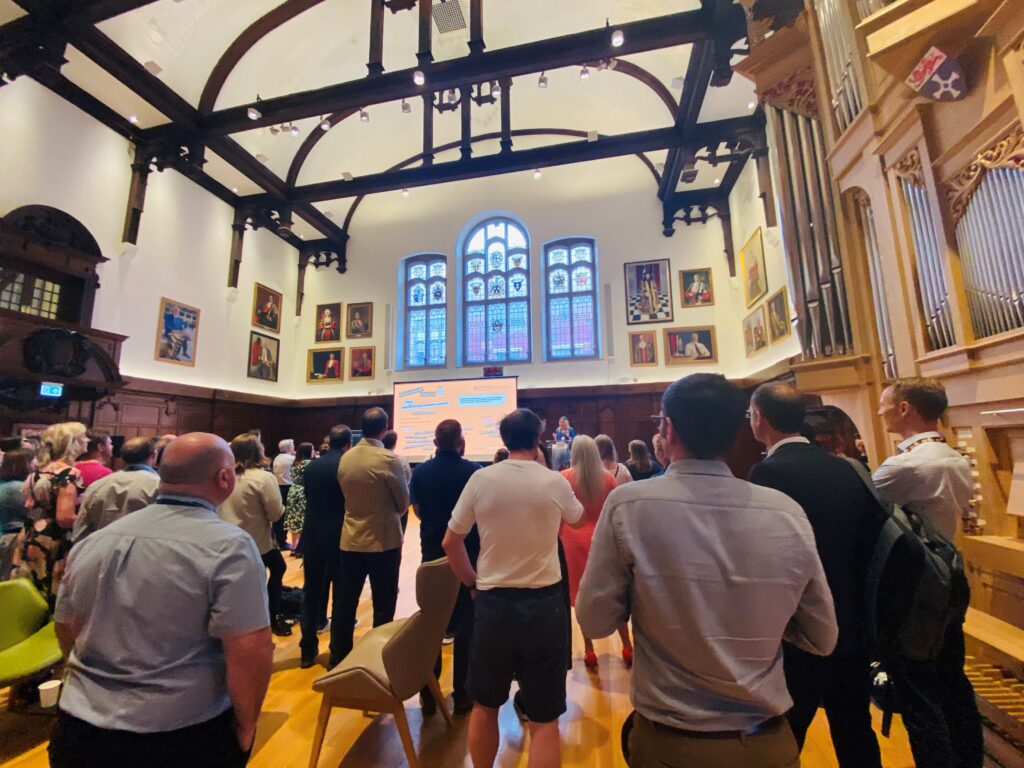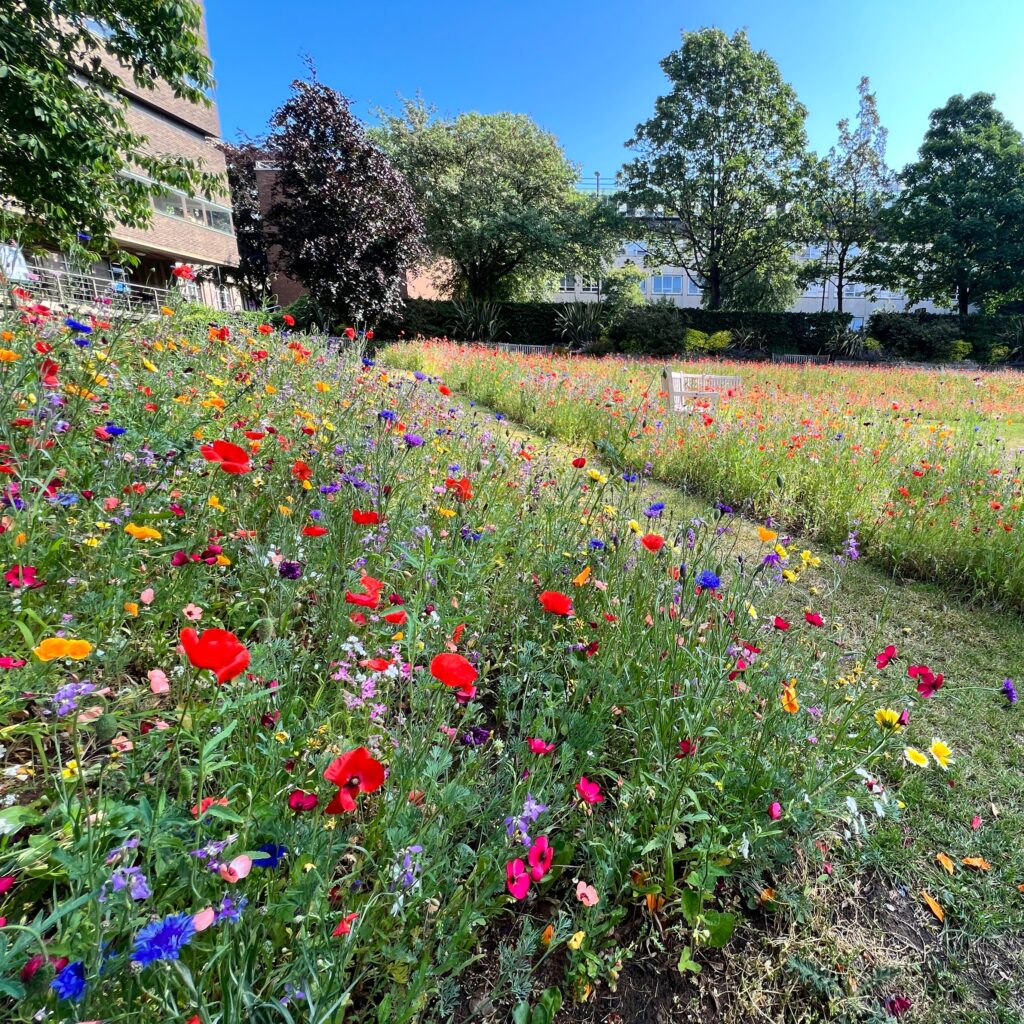Annabel has been in the Sustainability Team for just under a year. She has had the job of Sustainability Communications Placement Graduate (such a short and snappy job title, I know!). She has been one of two placement colleagues in the team hired for 12 months, and managed to get a sustainability engagement job in London with a waste and recycling focus, so has recently left the University.
We interviewed Annabel on how she has found her placement year, making her the subject of a blog post after being the author of so many!
The Sustainability Team plans to welcome placement students/graduates into the team each year, so read on to find out more about the role.
How have you found it?
I have really enjoyed this year! I was a little worried before starting my job that I would struggle, especially as I did not have an environmental background, but everybody has been really supportive, and I have learnt so much.
Your role is varied, but what have you spent most of your time on?
I would say there is no one task I spend more time on than others as it really varies depending on the time of year. For example, during audit season a lot of my time was spent conducting/writing up audits. One thing that I would say has been continuous throughout the year is contributing to our blog, twitter, and newsletter and engaging with the staff/student population.
What has been your favourite part of your role?
My favourite part of my role has been feeling like I am making a difference. I love knowing that every bit of work I do has a purpose and contributes to positive change at the University. One of my favourite things I organised this year was a Climate Anxiety workshop. As something I am very passionate about, I was excited to be able to get a local organisation to come and host a workshop for University Mental Health Day. The workshop was both interesting and engaging and everybody who attended thoroughly enjoyed it.
What have you learnt from your time with the Sustainability Team?
So much – it’s honestly so hard to pick one or two things! I have learnt a lot about sustainability within higher education and about the running of Newcastle University as a whole. I didn’t realise how many people were involved with the upkeep of the University. From, disposing of all kinds of waste to the planting of wildflowers each person has an important part to play.
Everybody within the sustainability team has been a huge inspiration to me. Their passion for making positive change inspires me to work hard and be the best that I can. The team has been so supportive and have created an amazing working environment. I couldn’t recommend working for them enough!
What skills have you acquired or honed?
I would say the main thing that this role has given me is confidence. At the start of my time with the team, I was so nervous to do small tasks like send an email to someone I didn’t know or with a more senior role. I also wasn’t sure that I could make an impact with my work as the newest member of the team. Now reflecting back on all the things, I have accomplished this past year, I would say my confidence has grown massively.
Another skill I would say I have improved is my problem-solving skills. As my role is so varied, I get a range of different tasks to tackle each week. From helping with the Fairtrade accreditation to assisting with the University’s furniture reuse programme, each task is a completely new experience and a chance to learn from a new perspective.
Have you been able to link your work to the Sustainability Team’s goals and the wider University’s goals?
For sure! Everything myself and other members of the team do is working towards the University’s target of Net Zero by 2030. Most of my work involves engaging with staff and students and showing them the sustainability initiatives, we are working on. It is impossible for us to reach our target without the involvement of the wider University community and so I know my work is important in helping us achieve our goal.
Another target the team had this year was to ensure our Energy and Environmental Management Systems were recertified. I helped work towards this target by helping with the internal audit process and helping ensure standards are met. I really enjoyed this part of my job as it allowed me to see parts of the University I had never seen before (such as the farms!) and learn about our management systems.
Have you been able to link your work to the wider climate crisis and things like the United Nations Sustainable Development Goals (UN SDGs)?
I would say that when working in sustainability, the climate crisis and the UN SDGS are always on your mind. Every week, myself and my colleague Charlotte create blog posts engaging with sustainability activity within the University and in the wider world. This gives me an excellent opportunity to think about the work the University is doing and how it relates to the SDGs.
This year when I helped host a Sustainability Week in March the SDGs were at the forefront of our planning. We made sure that every activity we held linked to the SDGs and the University’s core values of social and environmental justice.
What do you think of our office, and working in Estates and Facilities?
I like it! I have to admit, at first, I was a little apprehensive about working in a big open plan office as I had never done this before. This job was my first office-based role and I remember walking in on my first day being absolutely terrified! However, I quickly got over my nerves once I realised how friendly everybody in the office is. The Estates Office uses hot-desking instead of giving everybody a set seat and I love the way I get to meet new people and experience a new part of the office every day. Everyone in the office is also always happy to have a chat and help you out when you need it.
How about working at Newcastle University, how have you found that?
Being a staff member has allowed me to experience a completely side of the university to when I was a student. As an undergraduate, I didn’t know about the interesting public lectures that went on each month or the great one-off events hosted around campus. Being a member of staff allowed me more time to explore these events and find out about the great work going on.
I also loved getting involved in voluntary work across campus. Staff members at the university are also encouraged to volunteer around the University in different departments. During my time in my role, I acted as an interviewer for the Medical School, took part in research for Open Lab and helped marketing with an open day. All of these experiences were extremely rewarding, and I loved being a part of them.
How have you found flexible working (working from home, working on campus, and flexible hours)?
I have really liked having the ability to work flexibly! It’s been great being able to work from both campus and home as it ensures I can have more relaxed days when I need it. It’s lovely not having to rush to go to work in the morning and know you can get your work done from the comfort of you own home (with an ice coffee in hand!). The team’s ability to work flexible hours has also been a big help. It means that if I want to finish a bit early one day and go out and enjoy the rare sunshine I can and make up the hours another day. It also means I can take a longer lunch if I want to and get a delicious Poke bowl or Shijo!
What advice would you give to someone applying for or starting a placement with the Sustainability Team?
100% go for it! I can’t thank the team enough for all they have taught me and the support they have given. Embrace every opportunity you can, and you will learn so much about both the University and the sustainability industry as a whole.


